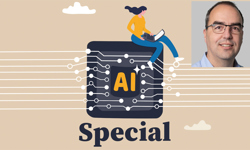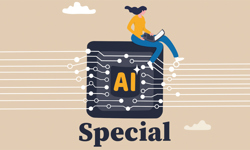
Generative AI is producing some efficiency gains but “nothing truly invaluable” said DMG Media CEO Rich Caccappolo. Such applications are now very common be it in publishing or in other sectors. My own straw poll of friends and family finds people using AI to write letters, to transcribe recordings, or conjure up images. A movie-maker is using it for ‘clean-up’ in production that before would take ages by hand. Deeper dives with AI include analysing Mars rover data and simulating thermodynamics within batteries, but these are research projects.
Most people are using it for quite mundane tasks, as its proponents argued they would, and its notable how quickly they’ve got used to doing so. In publishing, the conference heard, it’s widely used as a tool in language-based tasks like headline writing, transcription, tagging, SEO, summarising and the like. More ambitious and less common uses include turning match data into sports reports, or working with structured data to write news stories. But as one panel member put it, we’re seeing “no burning to the ground and starting again with AI”.
However, Caccappolo went on to explain how he thinks AI will change everything for publishers but in another way entirely. His publications block the AI bots and haven’t done deals with the AI engines, in a deliberately conscious decision to pass up short term gains in the hope of more lucrative gains in the long run. The attribution question, he explained, is yet to be resolved but when it is, everything will change, and publishers will find the tables turning in their favour.
When sources are properly attributed in generative AI, the argument goes, it will become like organic search is today: you will want your content to appear in it. If you’re content isn’t listed, you’ll want to know why.
“We all made the mistake of letting ourselves be commoditised,” he said, but generative AI offers a second chance. “We now have the chance to reverse that. I urge everyone not to take the short-term gain, and for all of us to work together with an eye on the long term.”
AI will disrupt everything with new money flows, businesses, revenue sources and search engines. “This is the chance to fix a lot of things that are bad in our space”, he said, but decisions publishers take now will have long-term effects and they shouldn’t be tempted by short term gains that will mean they miss out on larger, long-term gains.
It’s an interesting thesis and, for publishers, an uncharacteristically optimistic one after decades of seeing their dwindling revenues disappearing to search engines, social media platforms and other tech providers.
If AI-based search becomes the default search method for information on the web, as it is widely expected to be, the lack of attribution would be a disaster for publishers and indeed most other website publishers. It’s bad enough that big tech is serving up their content and selling advertising space against it, let alone that they don’t even say where it comes from. Attribution would stave off that worst case scenario for those the AI search decides to reference as attributed sources.
Attribution challenges
However, the question of attribution is not a straightforward one. Legal and technical minds are now fighting it out over what constitutes plagiarism, copyright infringement, an original work and many more issues tangled up with this question. If an AI answer draws on multiple sources and applies its own algorithms to summarise that in its own way, who contributed what? Who should be attributed and for what parts of it? Especially if the AI behaves like a black box, info in, info out, and it’s not transparent exactly what it’s doing or how. How do you attribute one idea that may merge two or more sources? What inputs is it taking from where? What about the sources that are left out? After all, AI can afford to be more selective than organic search. There are legislative reasons to resolve some of these questions, not least because they have legal implications. But it’s hard to see where we’ll end up.
If Caccappolo is right, and I hope he is, the real AI revolution for publishing will be on the consumption side rather than the production. The panel too seemed to anticipate this future. David Dinsmore, COO of News UK, sees it as an opportunity to play to publishers’ strength in their brand names, wondering how those will play into the distribution channels of big tech, promoting the brand while still holding onto brand values. Yet the platforms themselves will be up against the wall when the AI revolution comes. Look for new platforms, said panel members, because they will all change in the next five to ten years.
We heard suggestions that as AI is so far mostly limited to efficiency gains, it hasn’t lived up to its hype and that we’ve reached the top of the hype curve and we’re entering the trough of disillusionment. I think that trough came earlier. But, as I have said in this column before, I maintain that AI will radically change everything, in the wider society and global economy. It’s academic whether that’s for better or worse because it’s unstoppable. But it’s nice to think that the outcome does depend on how publishers play it; that they have some agency left. And it’s nice to hear thoughts about the future that aren’t all doom and gloom for a change. Especially from the Daily Mail.
This article was first published in InPublishing magazine. If you would like to be added to the free mailing list to receive the magazine, please register here.












